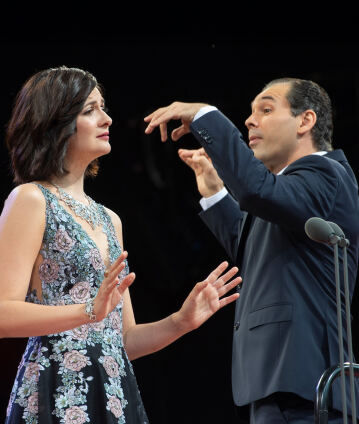Tugan Sokhiev conducts Prokofiev and Ravel at the Waldbühne

The Berliner Philharmoniker and conductor Tugan Sokhiev – music director of Moscow’s Bolshoi Theater – distinguish themselves as storytellers at this outdoor concert. We hear Prokofiev’s humorous music for the film satire Lieutenant Kijé, travel to the Orient with Maurice Ravel’s shimmering, sensuous song cycle Shéhérazade (soloist: Marianne Crebassa) and witness the most famous love story of all time in Prokofiev’s ballet music Romeo and Juliet.
When, how and where can one have more pleasant dreams of faraway, mysterious worlds than at the traditional Waldbühne concert of the Berliner Philharmoniker? Maurice Ravel’s three-part song cycle Shéhérazade is an irresistible invitation to send your imagination on a journey to magical, distant places under summer skies. The composer had already written a fairy-tale overture with the same title during his student days. The work met with mixed reactions from the audience at its Paris premiere on 27 May 1899, however. As a result, Ravel did not allow his score to be published. Four years later he again turned to the legendary fairy-tale princess from A Thousand and One Nights – in the form of three extremely sensuous orchestral songs that were received enthusiastically by the public. The poems by his countryman Tristan Klingsor which Ravel set for Shéhérazade were not based directly on the original Persian fairy tale but were inspired by the music of a symphonic suite by the Russian composer Nikolai Rimsky-Korsakov, which had its premiere in 1888 – a work that Ravel also greatly admired. At this concert the soloist for the cycle is Marianne Crebassa. The young mezzo-soprano is known for her sensitive interpretations of songs by French composers.
The performance of Shéhérazade at this Waldbühne concert is preceded and followed by two works by another Russian composer: Sergei Prokofiev, who like Ravel was a master of orchestral colour. The concert opens with the Suite from Lieutenant Kijé. Prokofiev had contributed the music for the satirical film comedy about the imaginary lieutenant in 1933, from which he composed the suite the following year. The work is not least an homage to Russian music of the 19th century. Prokofiev, who at the beginning of his career was decried as an enfant terrible, rarely wrote music that sounds so romantic or popular.
Tugan Sokhiev, the conductor of this Waldbühne concert, is still remembered fondly by many concertgoers from his four-year tenure as chief conductor of the Deutsches Symphonie-Orchester Berlin. To conclude this concert, Sokhiev, currently music director of the Orchestre National du Capitole de Toulouse and artistic director of the Bolshoi Theatre, has chosen excerpts from Prokofiev’s music for the ballet Romeo and Juliet, which was premiered in 1938. This work suits the setting of the orchestra’s last concert of the season at the Waldbühne perfectly. After all, the immortal story of the Veronese lovers – to paraphrase William Shakespeare twice – was always the stuff that (musical) midsummer night’s dreams are made of.
© 2019 EuroArts Music International
Category
Artists
Our recommendations
- “World Encores” with Mariss Jansons and Vadim Repin at the Waldbühne
- Gustavo Dudamel conducts Tchaikovsky and Brahms at the Waldbühne
- An “Oriental Night” with Neeme Järvi and Janine Jansen at the Waldbühne
- Season finale at the Waldbühne with Daniel Barenboim
- Seiji Ozawa conducts a Gershwin Night at the Waldbühne
- A “St Petersburg Night” with Daniel Barenboim and Zubin Mehta at the Waldbühne